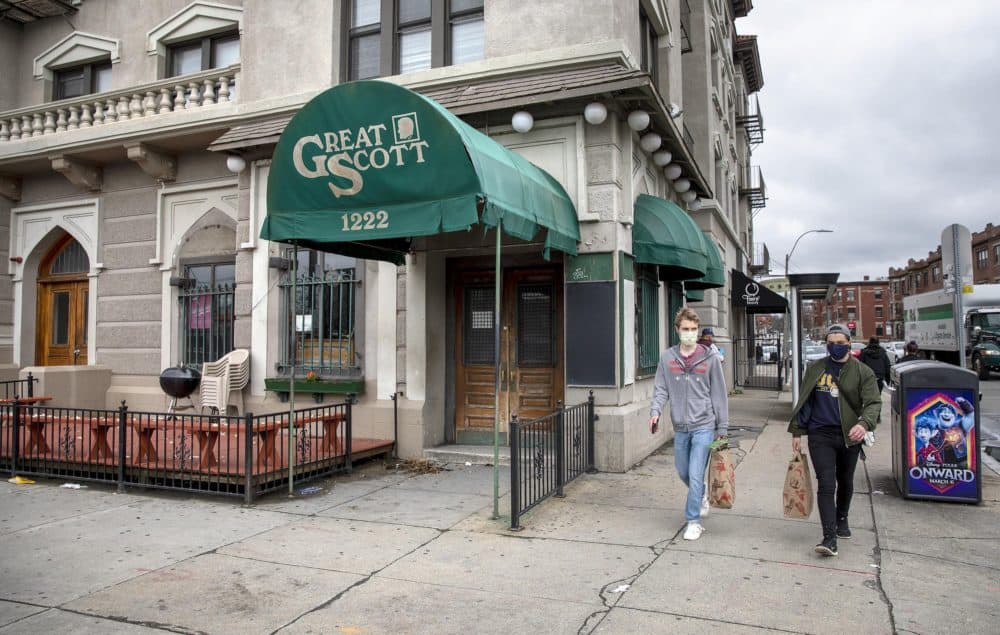Advertisement
After 44 Years, Allston Rock Club Great Scott To Close

At the intersection of Commonwealth and Harvard avenues sits Great Scott, a beloved music venue where local bands and touring acts played for 44 years. The Allston rock club hosted shows spanning all genres — punk, metal, hip-hop, industrial, indie and pop. It was home to Don’t Ask Don’t Tell, a queer dance party, and the pill, an indie dance party. But after the COVID-19 pandemic passes, the venue will not reopen its doors.
Tim Philbin, general manager at Great Scott, shared the announcement on Facebook and Twitter Friday, May 1, and wrote about the venue’s history. "For 44 years Great Scott has provided entertainment and more than a few beverages to a loyal group of customers. From its inception in 1976 as a local bar featuring Blues and Folk performers to the 1980s and 1990s as a beloved college dive featuring cover bands and DJ nights, to the 2000s and its emergence as one of the best live music venues in the city, Great Scott has meant many things to many people."
The building Great Scott occupies at 1222 Commonwealth Avenue in Allston is mixed use with commercial properties on the ground floor and residential rental units on the upper floors. The club was a tenant-at-will, with no written agreement. The owner of the building is Oak Hill Properties, LLC. According to Philbin, Oak Hill said that the live music shows interfered with its ability to command premium rent, and to rent out some of the other commercial properties.
A lawyer for Oak Hill, which owns the building, confirmed that noise complaints from residential tenants had prompted the company, in February, to ask Great Scott to move its business model away from loud concerts. But the lawyer, John Mangones, said that Oak Hill had also given Great Scott’s owner, Frank Strenk, the option of soundproofing the club — and that when Strenk declined, citing the project’s prohibitive cost, Oak Hill rescinded both its requests and instead offered to negotiate a long-term lease. “It’s difficult to deal with a period of vacancy,” Mangones said. “Ultimately, landlords just want to keep the rent … coming in.” According to Mangones, Great Scott was paying $17,000 in rent a month. He added that Oak Hill might have tried to raise the club’s rent to compensate for the anticipated costs of tenant turnover, but that no formal lease had been drafted.
Ultimately, it was Strenk who officially ended Great Scott’s at-will tenancy, in a letter sent on May 1 to Oak Hill Properties by his attorney. According to Oak Hill, Strenk decided that Great Scott’s prolonged, state-mandated closure in response to COVID-19 was simply too expensive and carried too many uncertainties to continue any longer. This characterization was backed up in email correspondences between the two parties’ lawyers that were shared with WBUR by Oak Hill Properties.
Josh Sessler worked as a sound engineer at Great Scott for six years. He said the venue was more than a place to work — it was a home. “If you walk in there any day, which I did frequently, after working at another place, you could walk in at 1 in the morning and you know there’s going to be at least three people that you know,” he said. “It was more than a venue, it was definitely a home for a lot of people.”
Great Scott cultivated a welcoming environment, said Nick Grieco, who plays in post-hardcore band Actor|Observer. “Great Scott was the epicenter of Boston music. It was the mid-sized club that everyone wanted to play, and everyone who played it had a great experience. The staff cared, the community was active, and the drinks were cheap,” Grieco said. “It was one of the last remaining safe havens that our music scene had. I've had multiple bands get their footing thanks to Great Scott, and some of the best shows I've ever played or attended have been there. I always run into friends there, and I always know I'll be treated with respect there.”
Advertisement
Ryan Agate, an independent booker who’s booked shows at venues all across Boston, started booking shows at Great Scott in 2007. “[I] just put on shows, went to shows, hung out with friends, went to the day bar...Great Scott was a part of my daily life.” And the club served as a launching pad for many bands. “Great Scott was the place where a band who started in a basement who went to O’Brien’s who then went to Great Scott and sold out, that’s where you see the bands like Speedy Ortiz and Palehound and Pile who started in basements and sold out Great Scott and that’s when they said, ‘We got this.’ And then they went on to sell out bigger venues and tour the country,” Agate said.
Grieco said that Boston cannot afford to lose any more music venues. “The Boston music community was already suffering serious losses. Small clubs across the city have been dropping like flies, and The Middle East is already blacklisted in the community. There's really not much left at all besides O'Brien's, in terms of accessible venues for fledgling artists where they can feel safe and respected.”
For Sessler, Great Scott had far-reaching impact. Losing Great Scott is “an unbelievably huge blow to the local scene, but not only the local scene, but the national scene as well...I think about this one a lot, but I’ve had a guy come in from Australia, he’s a touring sound guy...He told me he gets extremely excited when he sees his tour schedule involves Great Scott,” Sessler said. “This is a guy that usually works at much larger venues. He told me that’s one of his favorite places in the world.”
Grieco added that re-entering the world after the lockdown to a city devoid of culture would be devastating. “Let Great Scott's legacy be that it motivated our city and elected officials to put legislation into place that preserves our cultural landmarks. There is no question that Great Scott was the poster child for what one of those looks like. We actually can't lose another venue. There won't be any left to lose. We'll lose an entire generation of Boston musicians with it."
Correction: WBUR deleted some portions of an earlier version of this story that incorrectly reported Oak Hill Properties terminated Great Scott's lease. We regret the error.
Amelia Mason contributed reporting.
This article was originally published on May 01, 2020.
